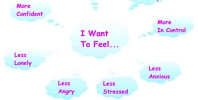We all fall victim to multitasking. We want to do so many things at once. For example, we might want to get our most important task done during the day. But because this task is usually the most grueling and take the longest to do, if we have short attention span and no way to stay patient for hours in a moment, then we often "cheat" by thinking we can get multiple things done at the same time.
What happens is that are focus and our attention become separated into different areas. I'm a victim of this too. Sometimes as I'm writing I am tempted to look at ways to improve my blog, dealing with emails, checking up information on the internet, and doing writing all at the same time. I will have like 4 to 5 websites tabs open in my web browser that stretches my focus into different areas and the result is I barely get anything done.
Perhaps you also go through your daily basis with the same problem: getting little things to no things done because you spend most of your time focusing on multitasking everything.
I believe the reason we end up multitasking is subconscious because of two things.
· Fear
· Anxiety
Fear in the fact that we fear that we won't get all the things done on time or at the end of the day. Our expectations of our tasks are so high (sometimes we want to fulfill five or more tasks during a day) that we would rather feel "safe" by doing them all at once, thinking that if we can do everything little by little then eventually everything would get done. This thought helps release that fear.
Anxiety in the fact that we feel jittery and uncomfortable when things are not done. Even during these times we get tempted to get distracted by things such as talking to friends, getting something to eat which turns to watching TV, surfing on the internet, etc. It makes us feel comfortable that we are doing the things that are "easy" rather than "difficult" or "challenging." Thus, doing the little-easy things helps us release our anxiety, even if it's not something of our top priority.
Some people can pass for multitasking. But for most people that cannot focus well and stay disciplined, or having trouble thinking for long periods of time, multitasking can be more harmful rather than beneficial. You can get a lot more done if you focus on one task, get it completed, then focus on the second task, get that completed, and so on.
Tim Ferriss, the author of the 4-Hour Workweek, says that we should have simple notes that hold exactly what we need to get done during the day:
I use a standard piece of paper folded three times to about 2" x 3 1/2", which fit perfectly in my pocket and limits you to noting only a few items. There should never be more than two mission-critical items to complete each day. Never. It just isn't necessary if they are actually high impact.
Try making it a habit to have two or three must-do things you have to accomplish that you think have most importance or value to you, then do them separately first. As Tim's methods, it's a good idea to just jot down some notes on a simple, non-fancy, piece of a paper, and keep it with you until it's done.
By not multitasking, not only will be more engaged in doing your most important task, but you'll be a lot more productive in the long run.



